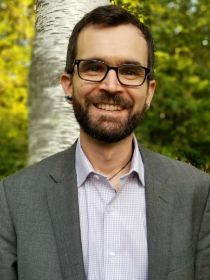Connect with Jason
About Jason
Houle is a sociologist interested in social disparities in mental health and well-being, processes of social stratification and mobility, and life course sociology.
Contributions
In the News
Quoted by Amy Norton in "When 'Nest Egg' Vanishes, Death Risk Rises," U.S. News & World Report, April 3, 2018.
Guest on Vermont Public Radio, January 19, 2017.
Research discussed by , in "Study Explores Link between College Debt, 'Boomerang' Effect," Minneapolis Star Tribune, January 8, 2017.
Research discussed by , in "Parental Debt May Affect Kids' Behavior," U.S. News and World Report, January 21, 2016.
Guest on Vermont National Public Radio, August 20, 2015.
Research discussed by "New Study Reports Worsening Health Conditions Increase Risk of Mortgage Default and Disclosure," AAAS EurekAlert!, January 14, 2015.
Research discussed by , in "Student Debt is Hurting Homeownership for Blacks More than Whites," Wall Street Journal, June 20, 2014.
Research discussed by , in "Foreclosures May be Driving the Rise in Suicides," Washington Post, May 19, 2014.
Research discussed by , in "Foreclosure Linked to Higher Suicide Rate: Study," Huffington Post, May 19, 2014.
Research discussed by , in "The Middle Class Student Debt Squeeze: Meet Jacinta Bader," Al Jazeera America, February 3, 2014.
Guest on Vermont Public Radio, January 14, 2014.
Research discussed by , in "Guess Which Students Have the Highest Student Loan Debt?," CNBC/NBC, December 11, 2013.
Research discussed by "Solving the Riddle of the U.S. ‘Suicide Belt’," Robert Wood Johnson Foundation, June 12, 2013.
Interviewed in "Why Don’t Depressed People Live as Long as Others?," Robert Wood Johnson Foundation Human Capital Blog, April 24, 2013.
Publications
"Out of the Nest and into the Red: The Dynamics of Debt in Young Adulthood," The Society Pages, 2014.
Lays out the state of knowledge on debt in young adulthood, specifically describing how 1) young adult indebtedness has changed across generations; 2) how debt in young adulthood is linked to social stratification and inequality; and 3) the consequences of debt for the economic, social, and psychological well-being of the current generation of young adults.
"Are Student Loans Replacing Mortgages? Student Loan Debt and Home Buying," (with ), Dartmouth College, July 31, 2014.
Challenges the dominant notion that rising student loan debt is dragging down the housing market, or otherwise leading young adults to delay or forgo home buying. We find little evidence that student loan debt is associated with home ownership outcomes, and instead find that both the recession and high unemployment among college goers make a far greater contribution to the downward trend in home buying among young adults than does student loan debt.
"A Generation Indebted: Young Adult Debt across Three Cohorts" Social Problems 661 (2014): 448-465.
Asks how indebtedness in young adulthood has changed across three cohorts (or “generations”) of young adults, with a focus on Early Boomers, Late Boomers, and Generation Y (the Millennials). I find that debt burden (debt relative to economic resources) has increased dramatically among young adults over time. Moreover, changes in debt and credit use are tied to social inequality – over time, disadvantaged young adults are increasingly using credit card debt in order to keep up with their stagnating incomes, while advantaged and college-going youth are taking on debt that helps them attain wealth.
"Disparities in Debt: Parents’ Socioeconomic Status and Young Adult Student Loan Debt" Sociology of Education 87 (2014): 53-69.
Explores how parents’ socioeconomic resources influence the amount of student loan debt that their adult children take on in pursuit of a postsecondary education; finds that young adults from less advantaged backgrounds (low education and minority households) leave college with a great deal more in debt than their more advantaged counterparts. Also finds evidence for a “middle income squeeze” – such that young adults from lower-middle income backgrounds ($40k-$60k a year) carry significantly more student loan debt than their counterparts from higher and lower income backgrounds.
"The Home Foreclosure Crisis and Rising Suicide Rates, 2005-2010" Michael Light 104, no. 6 (2014): 1073-1079.
Addresses a key puzzle in public health: Why have middle-aged suicide rates increased dramatically over the past decade? We suggest that the foreclosure crisis may explain part of this rise in middle-aged suicide. We find that rising foreclosure rates in U.S. states are associated with rising suicide rates. Moreover, we find that these effects are strongest for the middle-aged (age 46-64), suggesting that the foreclosure crisis may be responsible for rising suicide rates among this age group.
"Mental Health in the Foreclosure Crisis" Social Science & Medicine 118 (2014): 1-8.
Expands the dialogue on foreclosure and health, and considers home foreclosure not just as a stressful event for homeowners, but as a process that impacts entire communities and has impacted low socioeconomic status and minority communities more than their affluent, white counterparts. Specifically, I examine how living in high foreclosure communities during the foreclosure crisis impacted community members’ mental health. I find that a rise in the local foreclosure rate is associated with a decline in residents’ mental health, and that these effects are strongest in low SES and minority communities. These findings suggest that the foreclosure crisis may have increased existing social disparities in mental health and well-being.
